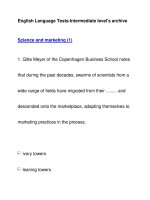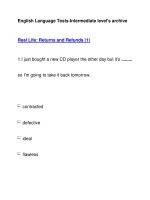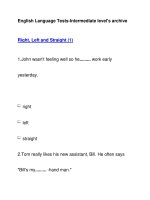Waves, wind, water, and ice 1
Bạn đang xem bản rút gọn của tài liệu. Xem và tải ngay bản đầy đủ của tài liệu tại đây (5.78 MB, 11 trang )
Waves,
Wind, Water,
and Ice
Lesson 1
Copyright © by Harcourt, Inc.
All rights reserved. No part of this publication may be reproduced or transmitted in
any form or by any means, electronic or mechanical, including photocopy, recording,
or any information storage and retrieval system, without permission in writing from the
publisher.
Requests for permission to make copies of any part of the work should be addressed to
School Permissions and Copyrights, Harcourt, Inc., 6277 Sea Harbor Drive, Orlando,
Florida 32887-6777. Fax: 407-345-2418.
HARCOURT and the Harcourt Logo are trademarks of Harcourt, Inc., registered in the
United States of America and/or other jurisdictions.
Printed in the United States of America
ISBN-13: 978-0-15-349181-8
ISBN-10: 0-15-349181-7
1 2 3 4 5 6 7 8 9 10
179
15 14 13 12 11 10 09 08 07 06
If you have received these materials as examination copies free of charge, Harcourt
School Publishers retains title to the materials and they may not be resold. Resale of
examination copies is strictly prohibited and is illegal.
Possession of this publication in print format does not entitle users to convert this
publication, or any portion of it, into electronic format.
Waves,
Wind, Water,
and Ice
Lesson 1
Lesson 1
What Causes Changes to Earth’s Surface? . . . . . . .2
Visit The Learning Site!
www.harcourtschool.com
1
VOCABULARY
VOCABULARY
earthquake
landslide
creep
volcano
lava
dune
What Causes
Changes
to Earth’s
Surface?
A seismograph records the
shaking of the earth from
an earthquake.
2
A landslide can be very
dangerous. Rock and soil
suddenly slip downhill.
Creep can slowly block
mountain roads.
This mountain is a volcano
that was formed by molten
rock.
Lava can flow quickly down
a volcano’s side.
A dune can change shape
when the wind blows.
3
READING FOCUS SKILL
COMPARE AND CONTRAST
You compare when you look at how things are
alike. You contrast when you look at how things are
different.
Compare and contrast how quickly earthquakes
and creep change Earth’s surface.
Earthquakes and Landslides
Giant slabs of rock move in Earth’s crust. An earthquake
is the shaking of Earth’s crust. Shaking is caused by
sudden movements of the slabs.
Earthquakes cause fast changes in Earth’s surface. Huge
cracks open. Parts of the ground tilt up. Mountains can
rise higher. Buildings can break and fall down.
A landslide also happens quickly. A landslide is when
rocks and dirt rush down a hillside. Piles of dirt and rocks
are left at the bottom. Holes are left where dirt, trees,
rocks, and houses used to be.
The ground moved along
the crack. The movement
was part of an earthquake.
4
Some changes to Earth’s surface happen slowly. Creep
is when dirt and rocks move very slowly down a hillside.
The dirt and rocks can move things in their path. Over
time, fence posts on a hill become tilted. Over a long
time, creep can even flatten a hill.
Contrast how an earthquake and creep change
Earth’s surface.
Creep caused the curves
of these tree trunks.
5
Volcanoes
A volcano is a mountain formed by the flow of lava.
Lava flows from a crack in Earth’s surface. Lava is molted,
or melted, rock at Earth’s surface.
Volcanoes cause harmful or helpful changes. The ash
from a volcanic eruption can break down into rich soil.
Lava from volcanoes in the sea can form new land.
Contrast harmful and helpful changes a volcano
can cause.
Mount Shasta is a
large volcano in
California
6
Ice and Wind
Glaciers are huge sheets of ice. The slow movement
of glaciers changes Earth’s surface. Glaciers make valleys
wider and gradually scoop holes in Earth.
Wind changes Earth’s surface, too. A dune forms when
wind blows sand into a mound. Dunes are common in
the desert.
Contrast the changes that wind and glaciers
cause.
Wind can build huge
sand dunes.
Review
Complete these compare and contrast statements.
1. ______ and ______ both change Earth’s
surface.
2. ______ causes change to Earth’s surface slower
than a ______ does.
3. Volcanoes can cause harmful or ______
changes.
4. Changes to Earth’s surface can happen ______
or slowly.
7
GLOSSARY
creep [KREEP] The slow movement of soil or rock downhill.
dune [DOON] A large mound of sand piled up by wind.
earthquake [ERTH•kwayk] A shaking of Earth’s surface,
caused by movement of rock in the crust.
landslide [LAND•slyd] The sudden movement of rock and
soil downhill.
lava [LAH•vuh] Molten rock that flows from a volcano onto
Earth’s surface.
volcano [vahl•KAY•noh] A mountain that forms as molten
rock flows through a crack onto Earth’s surface.
8
Think About the Reading
1. What can you do to help you remember what you
have learned in this chapter?
2. What questions do you have after reading this book?
How can you find the answers to your questions?
Hands-On Activity
Use sand to model a dune. Explain how the dune was
made. You can do one of these.
1. Use your breath to show how the wind erodes
dunes.
2. Roll a pebble down the dune to show erosion.
School-Home Connection
Explain to a family member what you have read about
changes to Earth’s surface. Ask a family member to
describe changes he or she has seen.









